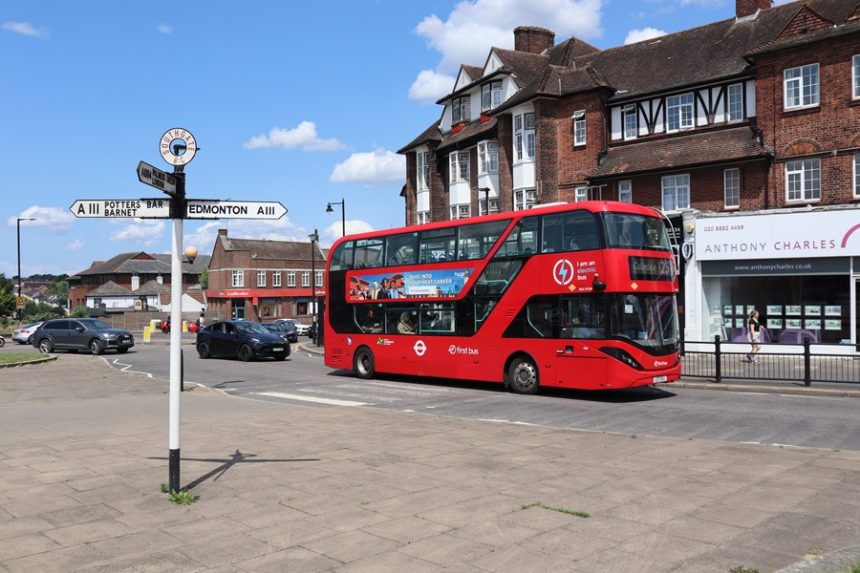First Bus parent FirstGroup has executed multiple purchases over the past two years, with the largest of those coming in February when it completed a transaction for the RATP Dev Transit London business. That added around 1,000 buses and a strong base of Transport for London (TfL) contracted income. The deal also returned First to the capital’s red bus market after its departure in 2013.
The acquired undertaking is now First Bus London. At the helm is Managing Director Bill Cahill. With over 50 years in the industry, he joined the London Transport engineering apprentice programme in 1973.
Having risen quickly and enjoyed 17 years in the Middle East, Bill returned to the UK and RATP Dev Transit London in 2022. That was expected to be for a relatively short tenure with a clear brief: Turn things around.
The business, which is active in the western half of Greater London, was having difficulties off the back of the pandemic period and into a time of mega-inflation. It was also bottom of the TfL operator performance table.
Bill’s task was to tackle that. Measures were developed, and they worked. Profitability returned and the operator now sits at around the top of TfL’s tables in multiple metrics.
After completion of the sale, work to integrate the organisation into First Bus structures began. The seller and buyer had many differences and there has been much change, Bill notes. Nevertheless, the first three months in new ownership were successful and expectations were exceeded.

London business in demand at time of sale to First Bus
While improvements continue under First Bus, the final two years in RATP hands saw what Bill describes as a rapid turnaround trajectory on operations and finance. When the time to sell came, interest from potential suitors was strong; around six such parties registered interest before the field was narrowed.
Under the recovery plan initiated in previous ownership, core was reducing the size of the business by 15%. “We did that, and we have now grown [back] by 5%,” Bill says. But spare depot capacity remains. That leads to thoughts of further expansion in the future, although change is already planned for the 10-strong depot estate.
Of those, six have electric bus charging infrastructure. Three more have plans for that equipment. The outlier – at Park Royal – has a ‘drop dead’ lease expiry in 2027. It is a 140-vehicle space, but work is well in hand to house the Park Royal fleet elsewhere.
Bill suggests that future new garages in London could involve an operating centre with buildings above it. Such an exercise in Edgware is currently at the planning permission stage. It calls for the bus depot to be in a basement, and while contentious owing to fears about fire, First Bus London sees merit in the approach.
Halfway to fleet’s zero-emission shift by 2027
A fully zero-emission TfL bus fleet across all contractors appears likely in 2034. Of the vehicles with First Bus London, 43% will be electric when a batch of BYD BD11 double-deckers take over route 18 early in 2026. By 2027, that proportion will be 50%.
The BD11s were ordered under RATP ownership. They will sit alongside battery-electric products from the BYD Alexander Dennis partnership, Wrightbus, and Switch Mobility.
The latter Metrodecker EV double-deckers have proved “challenging” to run. They joined RATP via purchase of the former Tower Transit depot at Westbourne Park. However, two have received major modifications by the builder and now perform well, Bill notes.

A strong depth of experience in battery-electric operation has given rise to many learnings. Range is key, and he observes that earlier ‘generation one’ buses are near their limits in that.
More recent deliveries with later iterations of battery and control technologies have solved the range problem, but ambient temperature remains an influence; challenges arise at below five degrees centigrade and at unusual highs owing to the resulting draw on heating or cab air-conditioning, respectively.
Knowledge of electric buses continues to build. Smart charging is an increasingly important tool in managing their operation. Controllers can now see the state of charge remotely, which assists decision making, and wider availability of power in depots is beneficial.
A previous test was that peak grid capacity could be available only between 2200-0600hrs. That is no longer true, which influences and assists smart charging. Bill believes that future generations of battery-electric buses will not necessarily require daily replenishment; instead, there is a likelihood that they will be plugged in and left for the charging management system to administer and allocate as appropriate.
VFM is not all about price for First Bus London
First Bus London’s strategy for route contract bids to TfL is clear, Bill continues. It is not the cheapest bidder, and he cautions that under-pricing can lead to big problems if performance is not beyond reproach. Tender prices have risen, but when coupled to disciplined delivery, that still gives value for money, he says.
“Price is key in TfL contracts, but quality and electrification are also important. The right price and the right service quality is the sweet spot, and I believe we are at that now.” First Bus London has some troughs and peaks around contract expiry dates, but TfL is endeavouring to flatten that on a wider basis.

While fleet and infrastructure are important elements of success, the human aspect is equally so. Work on driver recruitment, training and retention began under RATP. The engineering staff resource is robust, with a strong apprenticeship programme credited for that. The control function – which employs 97 people and provides 24/7 coverage – has also been improved and will be further so in the future.
The view on drivers is that attitude is key to recruitment while skills rely on training. That programme has been extended from six weeks in duration to 12. RATP did much to solve what was a shortfall of up to 10%; changes to the wage structure and exploration of why staff were leaving were part of that.
Around 3,000 drivers are on the First Bus London payroll. It needs to recruit between 300 and 500 per year; while ‘churn’ has decreased, the operator has a close eye on the average age of its workforce.
Bill notes that the task of driving a bus in London is increasingly challenging. The number of vulnerable road users and a congested road network are part of that. Under the bolstered induction programme, a new driver will benefit from what Bill describes as extended ‘buddying’ with an experienced staff member. Recruits are also properly introduced to their depot.
Workforce diversity is strong at First Bus London, and the operator believes it employs at least one person from every country in the world. The number of women within its driver ranks is nearing 20%, but apprenticeships in that discipline are not used. Bill is cautious around whether they are the right tool for the role and believes that the 12-week training approach adopted under RATP best suits the business’s needs.

Service delivery relies on controllers
Control of services is hands-on. There are operational control centres at Harrow, Shepherds Bush, Twickenham and Westbourne Park depots, with a centralised night team. Highly challenging routes have their own control station.
Bill observes that services into central London are the most susceptible to disruption. Notting Hill Carnival heavily impacts the operator’s area, and protests can be difficult to work around.
Headway management is a core skill of controllers, which is assisted by each bus having a mobile data terminal to inform the driver of how that develops. A visit to the Westbourne Park control room showed constant communication between people there and road staff; most controllers are former drivers.
Bill believes that the variety of measures begun under RATP and continuing with First Bus all contribute to the business’s ongoing turnaround. A 100% electric fleet is among ultimate goals. “In running buses, there is no silver bullet; you have to do many things consistently well,” he notes. Growing First Bus London beyond its current reach, and perhaps into new areas, is not ruled out as the group continues to reestablish itself in the capital.


























